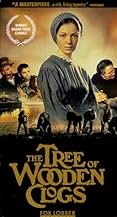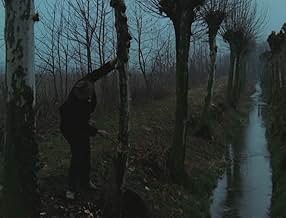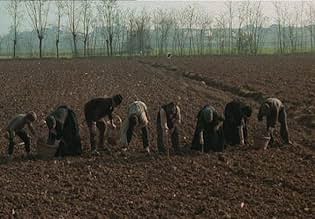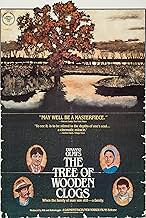Adicionar um enredo no seu idiomaPeasant life in a feudal farm in rural Italy at the end of the 19th century.Peasant life in a feudal farm in rural Italy at the end of the 19th century.Peasant life in a feudal farm in rural Italy at the end of the 19th century.
- Ganhou 1 prêmio BAFTA
- 18 vitórias e 1 indicação no total
Avaliações em destaque
Don't be afraid of this film. It does not actually seem long, nor does it seem aimless or plotless. While one may say that "the whole pesant community" is the real protagonist there are clearly defined characters in the film whose narratives we follow. In fact, the films strategy is one of integration of these narrative strands in a seemingly coherent and logical way. A wonderful, very emotionally moving experience with a clear, sharp, political analysis.
I can think of several films that have had that effect on me. Eric Rohmer's "Summer (Le Rayon Vert)" and Kieslowski's "Decalogue" spring to mind. But "Tree of Wooden Clogs" approached the core. I'm not Catholic, would pronounce myself an atheist if that didn't suggest the arrogance of certainty, but this movie comes as close to touching the soul as any I've ever seen. It is one of the most shattering, delightful, and profound works of art ever created. After first seeing it, I sat in my car, clutched the steering wheel, and sobbed for half an hour.
Since that day, many years ago, moments from it continue to haunt me. I'll be walking down a street lined with trees and remember the boy walking home from school. Out of the blue, the looks on the faces of the just-married young couple as they adopt a child will come to me. And, of course, the image of the villagers watching the lone wagon disappear into the darkness is one which will live with me until I die.
In short, as I stumble my own way through life, this film is one of the touchstones that reminds me why I'm here.
It is one of those films that is seemingly about nothing, but could be about everything. i didn't find its 3 hour length to be a problem. It is almost like watching a documentary about peasant life right down to its hand held camera techniques. It is subtle though. Not the shaky-cam or vomit-cam stuff you see today.
The cast is entirely made up of non-actors. Real peasants. And apparently it was shot using its local dialect, Bergamasque which then had to be dubbed into Italian for the Italian market. Olmi explains in the DVD extras that all of the non-actors did their own dubbing which I have to say is quite a technical accomplishment for amateurs.
The film opens with a farmer chopping the head off of a goose. A little later on the controversial scene depicting the slaughter and butchering of a hog is played out in almost real time. It is very graphic and quite disturbing. But just when I thought you would never want your kids to see this, Olmi cuts to two three year-old peasant kids watching the hog die with unbothered fascination. This is real life on a real farm.
And you can tell that it is done by a proficient butcher and is not a gratuitous add-on for exploitation. It is just something that Olmi has selected to include in the film.
I'd suggest this one for a change of pace.
Você sabia?
- CuriosidadesAll the actors were real peasants from the Bergamo province, in Italy. They had no acting experience at all.
- Erros de gravaçãoWhen the children are making music with pots and pans, the 'instruments' of the little girl are switching from one hand to the other when the camera looks at her from the other side.
- Citações
[first lines]
Don Carlo: That boy should be going to school.
Batistì: Yes but six kilometers to school and six kilometers back seems a lot.
Don Carlo: He's young, he has strong legs.
Batistì: Just when we're about to have another baby. He could have started helping me around the house.
Don Carlo: He'll help you even more when he's older. Let providence provide for now.
Batistì: I grew up without ever seeing the inside of a school.
Don Carlo: That's not a good reason, and you know it. If God has given your boy a good mind, it's a sign he's expecting more of him. As the boy's father, it's your duty to do God's bidding.
- Cenas durante ou pós-créditosQuite strangely, the names of the actors are listed as "last name first name", while the names of the rest of the crew are correctly listed as "first name last name".
- Versões alternativasThere are two versions of this movie: one which is spoken in the dialect of Bergamo, Italy, and one in which the actors dubbed themselves in Italian.
- ConexõesEdited into Bellissimo: Immagini del cinema italiano (1985)
- Trilhas sonorasIch steh' mit einem Fuß im Grabe BWV, 156
Composed by Johann Sebastian Bach
Performed by Fernando Germani
Principais escolhas
- How long is The Tree of Wooden Clogs?Fornecido pela Alexa
Detalhes
- Data de lançamento
- País de origem
- Idioma
- Também conhecido como
- The Tree of Wooden Clogs
- Locações de filme
- Empresas de produção
- Consulte mais créditos da empresa na IMDbPro
Bilheteria
- Faturamento bruto mundial
- US$ 9.367
- Tempo de duração3 horas 6 minutos
- Mixagem de som
- Proporção
- 1.33 : 1
Contribua para esta página



















